Finding foreign friendly restaurants and English speaking bars in Japan has become easier with sites such as https://japantouristfriends.com/, however you still have to be aware of your stay in Japan. The Japan government and local Kyoto city government have produced guides on how to behave properly during your stay in Japan. This is to keep the Japanese happy, to avoid common etiquette mistakes and to make your stay more comfortable without offending the locals.
Japan is known for being a very polite country with many specific customs and manners, from the correct way of lining up for a train, however crowded it might be, to the correct way to bow. Japanese people have a strong “sense of peace,” that they view an orderly community, social harmony, and stability as more important than individuality and freedom. This is largely true, and you will see it not only in Japanese companies or schools, but also in everyday life. Look around in the cities — everyone seems to wear very similar clothing, and sometimes the men’s suits all look exactly the same. Occasionally, there are a few people who try to stand out from the crowd, but you will mostly find them in strongholds of youth fashion and subculture, such as Tokyo’s Harajuku or Shibuya districts. In general, the sense that “everyone looks pretty much the same” is not an illusion, and the Japanese do not see anything wrong with that.
A surge in tourism in recent years has brought with it an outbreak of dirty toilets and misbehaving travelers. Kyoto especially is battling this problem in what might be seen as a typically Japanese way – issuing polite guidelines amplified by adorable graphics to illustrate their annoyance.
The city also hopes to address cultural conflicts arising from differences in lifestyles, according to an official memo on the website. Kyoto City has worked with TripAdvisor to create “AKiMaHen (Don’ts) of Kyoto,” a leaflet aimed at visitors.
The leaflet is topped with an illustration of five grumpy-looking Kyotoites captioned, “Kyotoites are pretty fastidious!”
Each impolite act gets an “AKiMaHen” rating from one mildly unhappy emoticon to three red, fiercely angry faces.
Some of the least unacceptable behaviors are tipping – how dare you! – and opening taxi doors by yourself. Taxi doors in Japan are opened and closed remotely by taxi drivers.
The most serious offenses include smoking outdoors in non-designated areas – punishable by a fine of 1,000 yen ($8).
Bicycling while drunk carries a whopping penalty of up to one million yen ($8,000) or five years in prison.
Other tips include being polite when asking a maiko (an apprentice dancer who wears a traditional kimono) for pictures and not canceling restaurant reservations at the last minute.
We ask that you keep with the Japanese way of thinking and have a look at the following guides:

kyoto japan good manners for foreign tourists

kyoto japan good manners for foreign tourists

